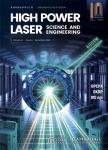Collimated quasi-monochromatic beams of accelerated electrons in the interaction of a weak-contrast intense femtosecond laser pulse with a metal foil
Collimated quasi-monochromatic beams of accelerated electrons in the interaction of a weak-contrast intense femtosecond laser pulse with a metal foil作者机构:Institute of Applied Physics Russian Academy of Sciences ul. Ulyanova 46 603950 Nizhny Novgorod Russia Joint Institute of High Temperatures Russian Academy of Sciences Izhorskaya ul. 13 125412 Moscow Russia Federal State Unitary Enterprise ‘‘Scientific and Industrial Corporation ‘Vavilov State Optical Institute’’’Birzhevay liniya 12 St 199034 Petersburg Russia
出 版 物:《High Power Laser Science and Engineering》 (高功率激光科学与工程(英文版))
年 卷 期:2013年第1卷第2期
页 面:80-87页
核心收录:
学科分类:080901[工学-物理电子学] 0809[工学-电子科学与技术(可授工学、理学学位)] 08[工学] 080401[工学-精密仪器及机械] 0804[工学-仪器科学与技术] 0803[工学-光学工程]
主 题:acceleration of electrons femtosecond laser radiation plasma wave self-modulation instability
摘 要:We demonstrated experimentally the formation of monoenergetic beams of accelerated electrons by focusing femtosecond laser radiation with an intensity of 2×1017W/cm2onto the edge of an aluminum *** electrons had energy distributions peaking in the 0.2–0.8 MeV range with energy spread less than 20%.The acceleration mechanism related to the generation of a plasma wave as a result of self-modulation instability of a laser pulse in a dense plasma formed by a prepulse(arriving 12 ns before the main pulse)is ***-dimensional and two-dimensional Particle in Cell(PIC)simulations of the laser–plasma interaction showed that effective excitation of a plasma wave as well as trapping and acceleration of an electron beam with an energy on the order of 1 MeV may occur in the presence of sharp gradients in plasma density and in the temporal shape of the pulse.



